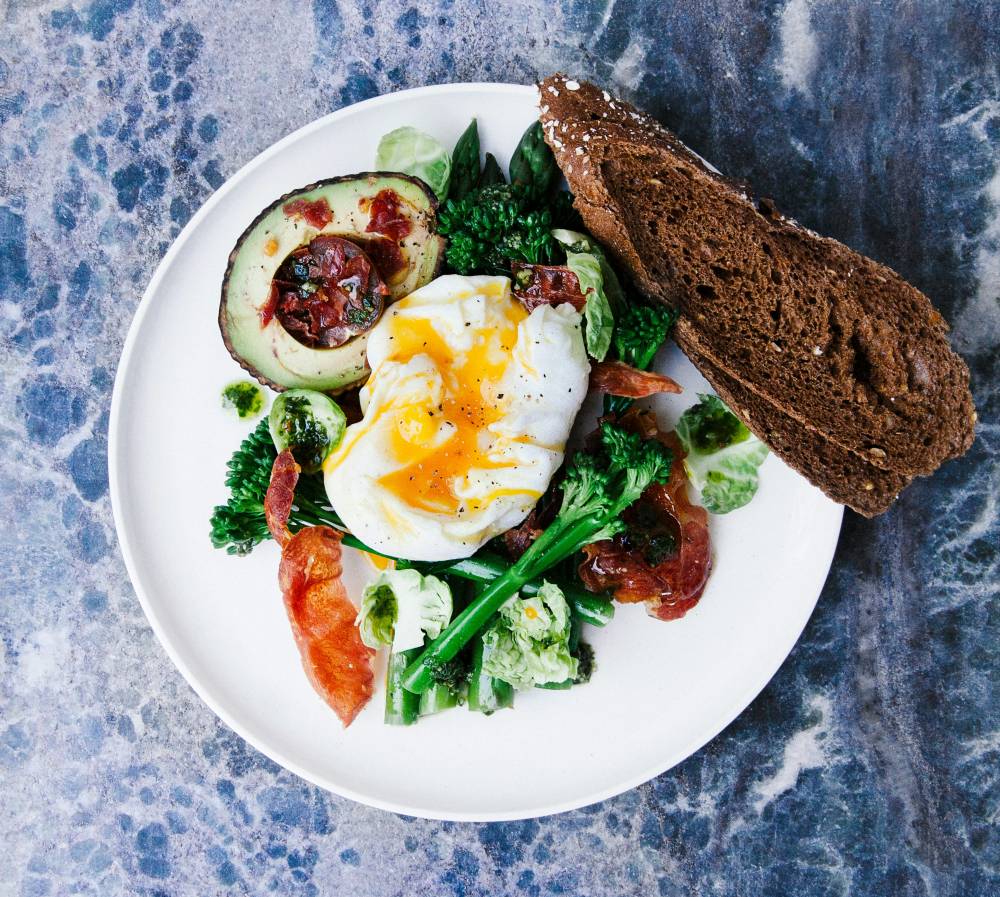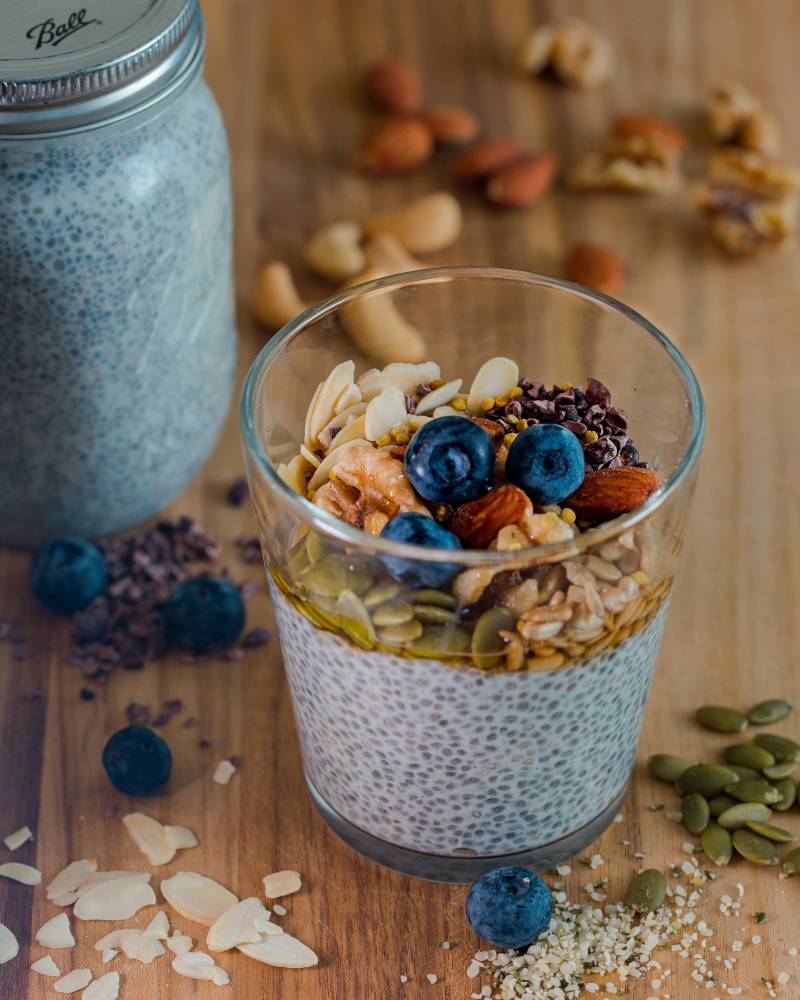Breakfast is your ultimate reset button

How you approach your first meal can truly shape the rest of your day. My mornings don’t feel complete without breakfast—it’s my daily reset before everything else begins. It sets the tone and rhythm for the day ahead—aligned with my food preferences, life stage, activity level, and wellness goals.
I look forward to preparing my favorite hormone-supportive meals, knowing they’ll help regulate my energy, metabolism, and mood. And I always take a mindful 20-minute breakfast before my first online personal training session, which usually starts at 7 a.m.—a powerful routine that fuels my mind and body.
Think twice (or more) before you skip breakfast
It’s okay to skip breakfast occasionally, but only if your body is in good balance: You’re sleeping well, managing stress, and not needing much morning energy because your workouts happen later in the day. If you naturally wake up late and prefer your first meal closer to lunch, that can still work as long as you feel nourished and energized.
However, if you wake up early, train in the morning, or often feel tired, moody, or crave food all day, your body is likely asking for fuel. Skipping breakfast in these situations can elevate cortisol, drain energy, and disrupt focus and hormone balance. When stressed (especially in midlife), sleep-deprived, or dieting too hard, your body needs nourishment—not restriction.
Your first meal can make or break your day
When you start the day with high-sugar or carb-heavy foods, you may notice more cravings later, post-lunch crashes, or low motivation during workouts. That’s because those foods trigger glucose spikes and cortisol surges—disrupting hunger hormones, mood, and focus.
On the other hand, a balanced, protein-rich breakfast that matches your body’s needs helps stabilize blood sugar, sustain energy, and keep your mind clear. It supports better workouts, stronger metabolism, and steadier hormones—setting the foundation for a productive and energized day.
Start balancing your hormones in the morning
Balance your hormones, reduce cravings, avoid late-night eating, and sleep better. It all begins with what you do in the morning—specifically, with your breakfast.
The first 30 to 45 minutes after waking up, known as the Cortisol Awakening Response (CAR), is the natural rise in cortisol that helps you feel alert and ready to start your day. Whenever you skip or delay your first meal for too long, cortisol levels can remain elevated, placing unnecessary stress on your body and disrupting hormonal balance.
Morning is also when your body is at its most insulin-sensitive, meaning you can process carbohydrates more efficiently and use them for energy rather than storing them as fat. This is why a balanced, nutrient-dense breakfast not only fuels your day but also supports hormonal stability, blood sugar control, and consistent energy.

To create a hormone-balancing breakfast:
- Eat within 30 to 60 minutes after waking to help regulate cortisol and glucose levels
- Include at least 20 to 30 grams of protein—from eggs to yogurt, chicken, fish, lean beef, seeds, nuts, or even sugar-free protein powder
- Add in healthy fats like olive oil, avocado, or nuts to stay full and stabilize blood sugar
- Choose high-fiber carbohydrates such as oats, buckwheat, quinoa, whole-grain bread, fruits, and vegetables to support digestion and gut health
- Have coffee after your meal, not before. Drinking coffee on an empty stomach can elevate cortisol further, leading to more glucose spikes, cravings, and mood swings
- Allow at least a 12-hour overnight fast between dinner and breakfast —for example, if you finish dinner at 7 p.m., aim for your first meal at 7 a.m.
Vary your breakfast foods
Rotate and mix different healthy, colorful foods throughout the week, as these habits can do wonders for your digestive system and overall health. A diverse breakfast supports a healthy balance of gut microbiota, the beneficial bacteria in your gut, which strengthens your immune function, supports hormone balance, and improves digestion and energy.
Here’s how I varied and rotated my breakfasts last week. Each meal typically contains 20 to 30 grams of protein and eight to 10 grams of fiber, enough to keep me about 80 to 85 percent full and comfortably energized until lunch—all prepared in just 10 to 15 minutes.
- Monday: Homemade protein bars, sweet potato-veggie omelet, sunflower seeds, and lanzones
- Tuesday: Protein pancakes (buckwheat flour, egg, chia seeds, and 1/2 scoop protein powder), mixed nuts, sunflower seeds, and strawberries
- Wednesday: Leftover lean ground beef over baked sweet potato with lettuce and tomato; chia bowl with 1/2 scoop protein powder, mixed nuts, strawberries, banana, and sunflower seeds
- Thursday: Sunny-side-up egg, hummus, and olive oil over homemade buckwheat bread with chia seeds, protein cookies, strawberries, banana, and Greek yogurt
- Friday: Tuna with a touch of mayo over baked sweet potato and lettuce with olive oil and lemon; protein berry bowl (strawberries, chia seeds, mixed nuts, and 1/2 scoop protein powder), and sunflower seeds
- Saturday: Sweet potato and veggie tuna omelet with basil, protein cookies, strawberries, and sunflower seeds
- Sunday (post-10K run treat): Cheesy scrambled eggs, hot pandesal with lettuce and tomatoes, protein smoothie (1/2 scoop protein powder, lettuce, and chia seeds), mixed nuts, and sunflower seeds
If you had a heavy late-night meal
Sometimes, late-night gatherings are unavoidable. In this case, still eat breakfast the next day, but make it lighter. You may not feel as hungry, so it’s fine to delay your meal a bit (even two to three hours after waking), but don’t skip it entirely.
Focus on a protein-packed and fiber-rich meal to help stabilize blood sugar and support your body after a night of indulgence. Remember, your body could still be under stress from the heavy meal or lack of sleep. A balanced breakfast helps sustain your energy and keep your metabolism steady.
Breakfasting well on a long weekend or while traveling
You can enjoy a protein- and fiber-rich breakfast wherever you are this long break to keep your energy, mood, and hormones steady, no matter where the day takes you.
- Anytime, anywhere: Bring your emergency protein foods such as seeds and nuts. With the long weekend (and for me, a week-long trip to Korea), I packed my own pre-made protein bars (each with about 20 grams of protein containing nuts, seeds, and protein powder). At the same time, I plan to explore local Korean breakfasts—choosing eggs, veggies, quality protein options, good carbs, and seasonal fruits to fuel our full-day trips
- At a buffet: Go for eggs, cheese, Greek yogurt, mixed nuts and seeds, and fruit. If you’re having a full meal, include a good source of protein (eggs, unprocessed meat, fish, tofu, or Greek yogurt), a serving of fibrous carbs (brown rice, oats, or whole-grain bread), and healthy fats (avocado, nuts, or olive oil) to promote fullness and stable blood sugar
- At a cafe: Choose protein- and veggie-packed sandwiches on whole-grain bread instead of sweet breakfast pastries
- At a convenience store: Opt for hard-boiled eggs, Greek yogurt, nuts, seeds, or sweet potatoes instead of instant noodles, pasta, or pork buns—which are often mostly bread and low in protein

















